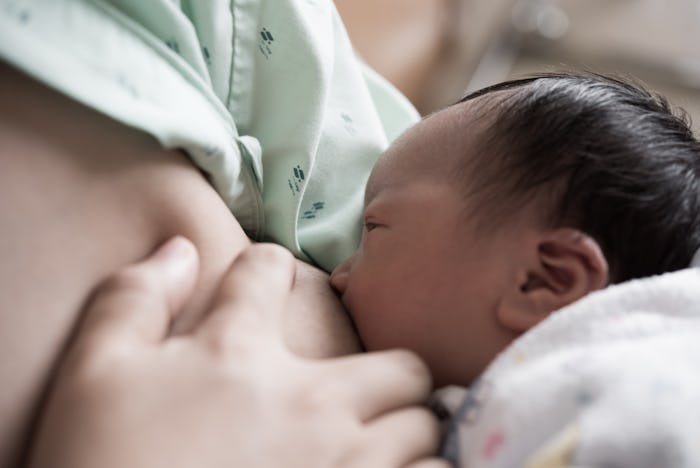Life

Here's What You Need To Know About Mastitis & Breast Cancer
As wonderful and life-affirming an experience as breastfeeding is, it also produces a whole host of worries. Am I producing enough? Will I be able to pump enough when I go to work? Is my baby's latch okay? But for nursing moms who experience the painful ordeal of mastitis, an additional fear may crop up: Can mastitis cause breast cancer? Is it possible that the very act of nourishing a child could somehow lead to a serious illness? It's enough to make even the most enthusiastic BFing mom nervous.
Mastitis is a non-cancerous breast infection that's common in breastfeeding mothers, according to the American Cancer Society. It can be caused by a number of situations, such as a clogged milk duct, waiting too long between feedings, or broken skin on the breast or nipple (as can happen when those little teeth clamp down a little too enthusiastically — ow!). These can all cause bacteria to enter the bloodstream and start trouble. Mastitis is treated with antibiotics, along with pain relievers and cold packs to ease the discomfort.
But can the infection turn breast cells cancerous? Absolutely not, says Naoto Ueno, M.D., Ph.D., professor of Breast Medical Oncology and executive director of the Morgan Welch Inflammatory Breast Cancer Research Program and Clinic at The University of Texas MD Anderson Cancer Center. "There has been no strong causal connection between mastitis and breast cancer," he tells Romper via email.
Research bears this out. One Swedish study published 10 years ago in the journal Epidemiology found a "slightly elevated" risk of breast cancer in women who had previously had mastitis (104 out of 8,411 patients). However, the researchers were quick to point out that these findings don't prove any definite link between mastitis and cancer. For one thing, the women in the study had infections severe enough to require hospitalization, so the research didn't take into account women with milder cases of mastitis.
What you do need to be aware of, however, is that the same symptoms that characterize mastitis can also be a sign of inflammatory breast cancer (IBC), a rare and aggressive form of the disease. "Patients with IBC are [often] misdiagnosed as mastitis," explains Dr. Ueno. "It presents with redness, skin changes, swelling, and/or pain. The symptoms completely overlap."
Unlike many other forms of breast cancer, IBC symptoms don't include a palpable lump. Instead, the cancer cells form and block the lymph nodes under the skin of the breast, causing breast redness, swelling, and itching. One breast may become larger, warmer, and heavier than the other, and the nipple may become inverted. IBC often causes the skin of the breast to thicken and develop a pitted appearance similar to an orange peel - a sign not normally seen in mastitis patients.
IBC symptoms develop rapidly and in a matter of a few months, according to the American Cancer Society. In one-third of cases, the cancer has already metastasized to other organs or bones by the time it's diagnosed.
"It's very difficult to tell the difference between IBC and mastitis," says Dr. Ueno. "But if you're prescribed antibiotics and they're not effective, you need to suspect IBC." He adds that risk factors for IBC can vary by race; black women who don't breastfeed are more likely to develop it than ones who do, and for white women, being pregnant later in life increases the chances of developing the disease.
The takeaway? Know your body and know the signs. See your doctor right away if you develop redness, swelling, pain and/or warmth in your breast. If the symptoms don't clear up after a few days of treatment, go back ASAP and ask about cancer screening.
Experts:
Naoto Ueno, M.D., Ph.D., professor of Breast Medical Oncology and executive director of the Morgan Welch Inflammatory Breast Cancer Research Program and Clinic at The University of Texas MD Anderson Cancer Center
Studies referenced:
Lambe, Mats; Johansson, Anna L. V.; Altman, Daniel; Eloranta, Sandra (2009) Mastitis and the Risk of Breast Cancer, Epidemiology, https://journals.lww.com/epidem/Fulltext/2009/09000/Mastitis_and_the_Risk_of_Breast_Cancer.22.aspx